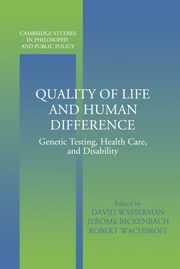Book contents
- Frontmatter
- Contents
- Contributors
- Acknowledgments
- Introduction
- 1 Assessing Quality of Life: Clinical versus Health Policy Uses
- 2 Predicting Genetic Disability while Commodifying Health
- 3 Preventing Genetically Transmitted Disabilities while Respecting Persons with Disabilities
- 4 Disability, Ideology, and Quality of Life: A Bias in Biomedical Ethics
- 5 Values for Health States in QALYs and DALYs: Desirability versus Well-Being and Worth
- 6 Preventing the Existence of People with Disabilities
- 7 Where Is the Sin in Synecdoche? Prenatal Testing and the Parent-Child Relationship
- 8 The Social Context of Individual Choice
- 9 Disability and Health Systems Assessment
- Index
8 - The Social Context of Individual Choice
Published online by Cambridge University Press: 03 December 2009
- Frontmatter
- Contents
- Contributors
- Acknowledgments
- Introduction
- 1 Assessing Quality of Life: Clinical versus Health Policy Uses
- 2 Predicting Genetic Disability while Commodifying Health
- 3 Preventing Genetically Transmitted Disabilities while Respecting Persons with Disabilities
- 4 Disability, Ideology, and Quality of Life: A Bias in Biomedical Ethics
- 5 Values for Health States in QALYs and DALYs: Desirability versus Well-Being and Worth
- 6 Preventing the Existence of People with Disabilities
- 7 Where Is the Sin in Synecdoche? Prenatal Testing and the Parent-Child Relationship
- 8 The Social Context of Individual Choice
- 9 Disability and Health Systems Assessment
- Index
Summary
INTRODUCTION
Philosophers and disability activists have concentrated much energy on the moral status of decisions about prenatal testing and selective termination on the grounds of fetal impairment. On the one foot, there is a range of arguments about wrongful birth and the immorality of choosing disability or of restricting the open future of a potential child. On the other foot, there is the expressivist argument about the messages that decisions to terminate pregnancies affected by disability send to disabled people and to the society in which they live. Disabled people have reacted with anger to technologies and programs that seek to avoid the birth of “people like us” or that might have meant that “we would never have been born.”
I am not persuaded by either set of arguments. My suggestion in this chapter is that resolving this interesting philosophical debate is not the priority for political and policy resolution of the selective termination issue. I do not believe that there is a single rational solution to the moral quandry of whether to terminate a pregnancy affected by disability, nor should there be. Every impairment is different, and each can impact on lives to a greater or lesser extent. Equally, every family and every life is different, so it is dangerous to generalize about the experience of impairment. Moreover, there are widely varying views about both disability and abortion within societies as well as between societies.
- Type
- Chapter
- Information
- Quality of Life and Human DifferenceGenetic Testing, Health Care, and Disability, pp. 217 - 236Publisher: Cambridge University PressPrint publication year: 2005
- 6
- Cited by



